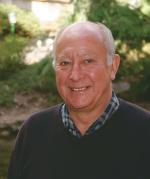Obituary - Professor Douglas Vickers
Professor Douglas Vickers (1940-2004) Professor Douglas Vickers died unexpectedly and suddenly at home on Sunday, October 31 2004. He was 64 years old and at the peak of his career as a psychophysicist. Professor Vickers completed his first degree (MA) at the University of Edinburgh in 1961. He went on to Cambridge, where he first took a BA and then completed a PhD in Experimental Psychology, supervised by Professor Alan Welford, who later became his Head of Department in Psychology at the University of Adelaide. However, he was first brought to Adelaide as a Lecturer in Psychology in 1967, the year he completed his PhD, by Professor Malcolm Jeeves, then Head of the Department. He was promoted to Senior Lecturer in 1973, Associate Professor on 1980 and Professor
in 2003. He delivered his Inaugural Lecture to the university on 30 September 2004. At the time of his death he was Deputy Head of the Department of Psychology. Professor Vickers won many prizes and awards throughout his career and was at the forefront of research internationally in several fields: perception, memory, problem solving, intelligence, language, and, particularly, decision making. His 1979 book Decision Processes in Visual Perception gained him substantial international attention and it is now regarded as a classic. The scholarly reach and prescience of his ideas in that work have ensured that it remains today required reading for students in the field. The success of his research owed much to a keen curiosity about all kinds of human interests and behaviours but, above all, to his remarkable capacity to pinpoint what is theoretically important. Reflecting a life-long interest in art, his most recent research examined how we make aesthetic judgments. Throughout his career, he managed to find and solve problems that were fresh and innovative, and fundamental to human psychology. It is unlikely that he would ever have stopped having new ideas, but it is a great loss that he was not given time to follow up some of the most important recent ones, which held promise for a radically different theory of human visual perception. At the time of his death he had written several books, published more than 50 journal articles, and been an invited keynote speaker at international conferences on many occasions. In 1994 the University of Cambridge awarded him the ScD degree for his distinguished contribution to science and learning. Only some half dozen psychologists worldwide have received this award. In 1999 he was elected President of the International Society for Psychophysics, and made a Fellow of the Academy of the Social Sciences of Australia in 2003. A man of many parts, he was fond of camping and the outdoors, vitally interested in literature and he loved conversation. He and his wife Yvonne married in 1965. They shared an adventurous, enduring relationship that, through their generosity and affection, enriched the lives of their many social friends and professional colleagues. They entertained frequently and in great style. Raised in Dunbar, Scotland, Douglas was fluent in French and qualified in three other European languages. Dedicated to high quality theoretical research, he was a generous and universally well-regarded colleague. But above all, Douglas Vickers was decent, straightforward, generous, considerate and warm in his dealings with others. His internal consistency and unfailing sincerity brought him a diverse range of friends who, though different from one another, all valued their relationships with him for similar reasons. He will be sorely missed by staff and students in the Department of Psychology and elsewhere throughout the university; but most especially by Yvonne, their children Marc and Anne, partners Katherine and Len and six grandchildren. Contributed by Ted Nettelbeck and Michael Lee
|





